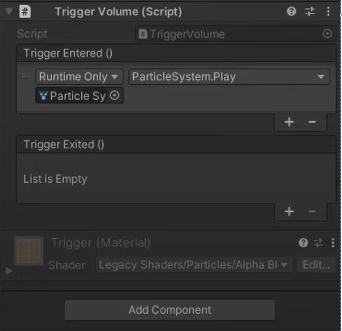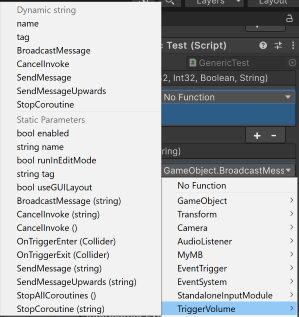Inspector-configurable custom events
Unity provides the UnityEvent API as a Unity-specific alternative to standard C# events and delegates. The main advantage of Unity events over standard C# events is that Unity events are serializable, meaning you can configure them in the Inspector window.
A UnityEvent can be added to any MonoBehaviour and is executed at runtime like a standard C# delegate. When a UnityEvent is declared in a MonoBehaviour it appears in the InspectorA Unity window that displays information about the currently selected GameObject, asset or project settings, allowing you to inspect and edit the values. More info
See in Glossary window where you can define callbacks that persist between Edit time and runtime.
Unity events have similar limitations to standard C# delegates:
- They hold references to the target object, which stops the target object being garbage collected.
- If you have a managed (C#)
UnityEngine.Objectas the target and the unmanaged (C++) counterpart object has been destroyed, the callback will not be invoked. Refer to Null references for more context.
Configure Unity events
Prerequisites
- Create a MonoBehaviour script which includes
using UnityEngine.Events - Declare at least one field of type
UnityEvent
Configure callbacks in the Inspector window:
Select the GameObjectThe fundamental object in Unity scenes, which can represent characters, props, scenery, cameras, waypoints, and more. A GameObject’s functionality is defined by the Components attached to it. More info
See in Glossary with the script component that contains your declaredUnityEventfield(s).Click the + button under the name of an event to add a slot for a callback.
Select the UnityEngine.Object you want to receive the callback. You can use the object selector or drag and drop an object into the field.
Select the function you want to be called when the event happens. The dropdown selector is populated with filtered lists of appropriate methods available on the GameObject and its components.
Repeat steps 1–4 as required to add additional callbacks for the same event.

Static and dynamic calls
When configuring a UnityEvent in the Inspector window there are two types of function calls that are supported:
-
Static calls are entirely preconfigured at authoring time, with their target and parameter values defined in the Inspector window. When the callback is invoked, the target function is invoked with the parameter values defined in the Inspector. This is appropriate for values that won’t vary at runtime, for example when you want to decrement a health value by a set amount every time a particular collisionA collision occurs when the physics engine detects that the colliders of two GameObjects make contact or overlap, when at least one has a Rigidbody component and is in motion. More info
See in Glossary occurs. Statically bound functions appear under Static Parameters in the function selection list. -
Dynamic calls are invoked programatically from your code, with parameters matching the type of
UnityEventbeing invoked. This is appropriate for values that vary at runtime, for example afloatrepresenting a variable amount of damage that a character sustains on each attack. The UI filters the callbacks and only shows the dynamic functions with signatures that are valid for the type ofUnityEvent. For example, if you have aUnityEvent<string>, the function selector lists any functions that accept astringparameter under the Dynamic string header.

Generic support in UnityEvent
By default a UnityEvent in a Monobehaviour binds dynamically to a void function. But you can create a UnityEvent with up to four generic type parameters as shown in the following example:
using UnityEngine;
using UnityEngine.Events;
public class GenericTest : MonoBehaviour
{
public UnityEvent<int, int, bool, string> myEvent;
// Start is called once before the first execution of Update after the MonoBehaviour is created
void Start()
{
if (myEvent == null)
{
myEvent = new UnityEvent<int, int, bool, string>();
}
myEvent.AddListener(Ping);
}
// Update is called once per frame
void Update()
{
if (Input.anyKeyDown && myEvent != null)
{
myEvent.Invoke(5, 6, true, "Hello");
}
}
void Ping(int i, int j, bool print, string text)
{
if (print)
{
Debug.Log("Ping: " + text + i + j);
}
}
}